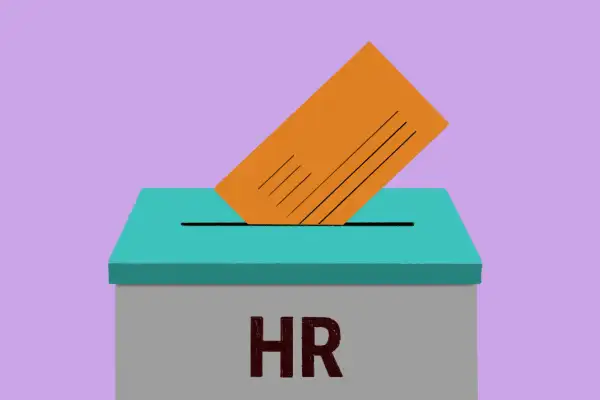Filing a Complaint with HR Can Be Scary. Here's the Best Way to Do It

If you’re like most Americans, you spend more time with your coworkers than your own family and friends. So if you ever feel uncomfortable—or unsafe—in the workplace, things can get hairy fast.
But going to your company’s human resources department can be awkward, or even scary. You may worry about rocking the boat, or getting someone in trouble. Sometimes, it's hard to tell whether or not your concern warrants a complaint in the first place.
Knowing how to properly navigate this process depends on a lot of factors: The nature of the situation, its impact on your job, and your company’s policies, to name a few. Here’s everything you need to know.
Not all grievances are created equally
Complaints take many forms. Maybe the person sitting next to you takes loud personal calls every day, or your boss is always an hour late for work. Maybe the problem is more severe — like you or a coworker is experiencing discrimination or sexual harassment.
If the issue doesn’t violate company policy or state or federal regulations, it may be best to handle things yourself.
Say the person sitting next to you has stinky lunches. Heading straight to HR with the issue is probably going to create a tense workspace, so try talking to her about it first. Enlist the help of your supervisor if you’re uncomfortable going directly to your coworker. If your supervisor is the offender, go to their boss.
Many coworker disputes are just “misunderstandings that snowball,” says Jaime Klein, CEO of Inspire Human Resources in New York. “People aren't usually setting out to mistreat others.”
If you’re unsure if your situation justifies a complaint, go ahead and file one — especially if it impacts your ability to do your job, Klein says. Employees shouldn’t shoulder the burden of determining whether something is “worthy” of a formal complaint or not. That’s HR’s job.
“No complaint is too small if it means an employee doesn't feel emotionally or physically safe in the workplace,” she says.
Try to do things by the book
Most companies have a code of conduct outlining exactly how to file complaints. But how they’re handled depends on the company.
Large companies usually have an entire HR department, whereas smaller organizations may designate one representative to handle these sorts of issues. The process varies, too. Some companies ask employees to call a hotline with complaints; others require them to be made in writing.
Once a complaint is received, an HR rep may ask you to submit any supporting information, like emails or voicemails that back up your side of the story, or contacts for anyone who may have witnessed the incident, says Amber Clayton, director of the Society for Human Resource Management’s HR Knowledge Center.
The HR team should then investigate the complaint and take action based on the severity of the issue.
“If there’s a violation of company policy and procedures or a violation of the law, then of course those are going to be treated differently than something minor," Clayton says.
Either way, you should keep tabs on the progress and follow up to ensure things get resolved, she says.
Escalate if you need to
HR complaints should be confidential and handled in an unbiased, professional way, Klein says. Federal law also protects workers who have filed a complaint from employer retaliation.
If your company doesn’t take your complaint seriously, or you feel the outcome is unfair, you can file a separate complaint with a government agency like the Equal Employment Opportunity Commission (discrimination and harassment complaints) or the Occupational Safety and Health Administration (safety complaints).
Any time you’ve raised an issue and nothing is done about it is a good time to take the complaint to the next level, Clayton says. Especially if it involves harassment, safety, or wages.
Be as professional as possible
Gossiping with coworkers about workplace issues—either in person or on social media—can quickly backfire. So try to maintain an air of decorum throughout the process.
This isn’t just good manners. If someone from HR hears that you’ve been using your coworkers as a sounding board to air grievances, it could affect the outcome of your complaint.
That doesn’t mean you should keep things to yourself, and hope that everything gets resolved on its own.
“Sunlight is the best disinfectant,” says Inspire Human Resources' Klein. “Issues need to be brought to light.”
More From Money
The Best Time to File Your Taxes